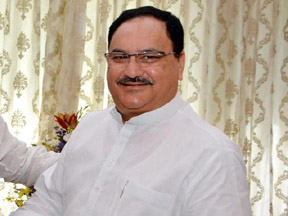
NEW DELHI: Union Health Minister J P Nadda has stressed on the need for close coordination between the Centre and states to deal with the outbreak of chikungunya and dengue, which have affected about 40,000 people in the country, even as he said there was no need to panic.
He assured all help to states in fighting the spread of vector-borne diseases and said it should not be an issue for indulging in blame game.
“We will try to fulfill all requirements. Whether it is dengue or chikungunya, we should not panic. There is need to give symptomatic treatment. There is a need to take a lot of liquid.
“We are ready to offer all help to state governments. This is not an issue for the Centre and states to indulge in blame game. We should work together,” Nadda said.
60 people have died across the country due to dengue. Eleven people have died in Delhi due to Chikungunya.
However, a senior Health Ministry official said the chikungunya deaths are being probed by its agencies to ascertain the exact reasons.
Nadda said that his Ministry had recently held a meeting with Delhi Health minister and various municipal agencies and directed them to follow all protocols while various other issues like providing guidelines, arrangement of beds, training of doctors have been provided.
He said the Ministry has also put a cap on rates charged by various testing facilities for the diseases while all technical support has been provided to the states to deal with the situation.
As per the National Vector Borne Disease Control Program (NVBDCP), around 27,879 cases of dengue have been reported across the country and 60 people have succumbed to the disease till August 31.
5,000 cases each have been reported from West Bengal, Odisha and Kerala. While West Bengal has reported 5,129 dengue cases and 22 deaths, the disease has affected 5,183 people and claimed nine lives in Odisha.
AIIMS, Delhi, has reported five “suspected” dengue deaths this month. The national capital has recorded nine dengue deaths this year. The number of those diagnosed with the virus in the city has risen to over 1,150.
Around 12,255 cases of chinkungunya have been reported across the country. Karnataka alone has recorded 8,941.
A senior Health Ministry official said that at this moment there is an “outbreak” situation with regard to chikunguniya.
Nadda said that his Ministry is conducting day to day review of the situation and whatever help is needed by state governments, his Ministry will provide it.
Later he tweeted, “I assure all necessary support from the Govt @MOHFW_India. Will soon review the status & situation.
“Request all States to work towards wellbeing of patients, especially those suffering from #dengue & #chikungunya,” he tweeted.
Stressing that people should ensure that breeding of mosquitoes does not take place in the localities, Nadda said that his Ministry has also launched an dengue app which provides vital information to tackle the disease.
“The Health Ministry is probing the chikungunya deaths in the national capital. Similar cases were reported in 2006. We are investigating them at our level first,” a senior official told PTI.
If somebody is already under treatment (for dialysis or under cancer treatment) and then the patient contracts chikungunya and dies, we do not call it chikungunya death, he said adding that whether these are deaths due to chikungunya will be verified once the investigation is over.
Meanwhile, another senior official said that the Health Ministry has issued 11 advisories to states and conducted 16 review meetings with them, five out of which were at the level of Union Health Minister asking it to step up preventive measures to tackle the diseases.
“We have told Delhi government and MCDs to intensify their efforts to prevent the disease. All the central government hospitals in the national capital are fully equipped to tackle the situation,” the official said.
Cabinet Secretary P K Sinha had recently held a review meeting and asked various agencies to accelerate preventive actions like fogging, running public awareness programs and putting up an effective monitoring system. -PTI





